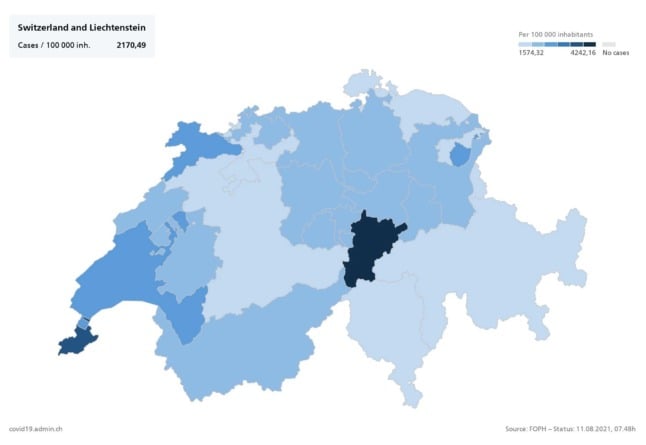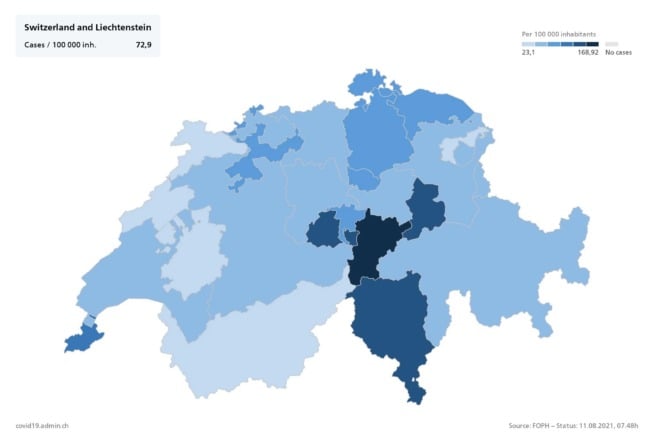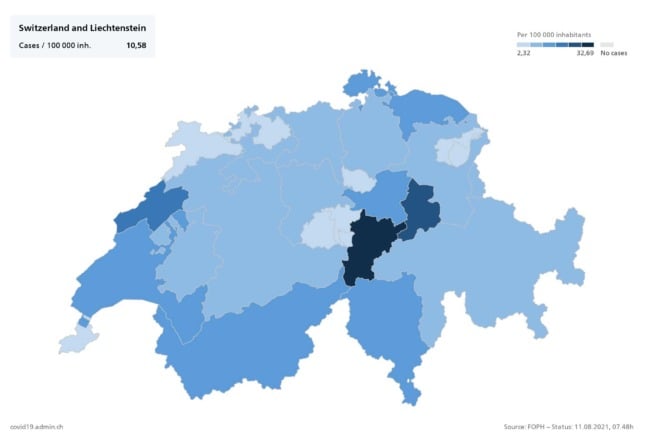MAPS: Where are Switzerland’s new coronavirus hotspots?

With the new daily count of coronavirus cases now exceeding 2,000, here is a look at which Swiss regions have the most infections, hospitalisations, and deaths, and how these numbers compare with previous waves.
Although the government hasn’t officially said so, Switzerland seems to be in the midst of a new wave, with the number of new contaminations topping 2,100 — almost triple of what it was only three weeks ago.
As the map from the Federal Office of Public Health (FOPH) shows, most cases, 336.82 per 100,000 people, are reported in Geneva, just as in the previous outbreaks.
The second-highest incidence, 300.24 /100,000 is in Basel-City.

Both areas exceed by far the national average of 170.4 / 100,000.
Other cantons that top the national average figure are Basel-Country (228.35) and Glarus (206.95).
On the other hand, Vaud and Ticino, which were hotspots during the previous two waves, are below the national average, with 161.1 and 134 cases per 100,000, respectively.
This link shows the evolution of cases in different geographic regions of Switzerland.
What about hospitalisations?
Despite soaring infections, the number of Covid-related hospital admissions has been relatively low, which makes this wave different from the prior ones, when Swiss intensive care units (ICUs) became overcrowded.
For instance, at the height of the pandemic in June 2020, the rate of coronavirus hospitalisations was 298,23 for 100,000 people. For the past two weeks, that number has been 2,94 / 100,000, though the actual count might be higher, due to reporting delays, FOPH says.
Two cantons currently stand out for the high number of Covid patients: Obwalden (18.44 / 100,000) and Glarus (17.25).
The number of hospitalisations is also above the national average in nine other cantons: Lucerne (4.84), Thurgau (4.65), Basel-City (4.6), Geneva (4.36), Zug (3.92), Basel-City (3.8), Schwyz (3.74), St.Gallen (3.72), and Solothurn (3.63).

“At the moment, it is mainly young people who are infected. They apparently don’t burden the hospitals, nor do they normally die from Covid”, said Health Minister Alain Berset.
Deaths
What is also different this time around is the coronavirus-related death rate.
From 100,51 cases for 100,000 in June 2020, this rate is now 0.12.
Only seven cantons exceed this national average, though all fall below 1: Basel-City (0.51), Basel-Country (0.35), Ticino (0.28), Lucerne (0.24), Zurich and Bern (0.19), and Aargau (0.15).

What is the government doing to curb the number of cases?
The Federal Council has no plans to implement new measures, through it is maintaining the ones currently still in place, including the mask wearing obligation.
Berset noted that no new restrictions are planned at the moment because current situation “is completely different” than it was during the first and second waves.
The reason: “Now we have the vaccination and two-thirds of the adult population in our country have had at least the first dose”.
READ MORE: Why Switzerland is not considering new measures despite rising Covid case numbers
On the other hand, authorities are urging those who are still unvaccinated to get their shots as soon as possible.
“This is the last moment to decide on the vaccination before the fall”, Berset said.
“It is an individual contribution to a collective effort”, he added.
While it is true that 55 percent of residents have had one shot of the Covid vaccine, only 49 percent received two doses needed to be fully protected against the disease.
This number is lower that the EU average of 52 percent.
READ MORE: Switzerland set to end free Covid testing for unvaccinated: reports
Comments
See Also
Although the government hasn’t officially said so, Switzerland seems to be in the midst of a new wave, with the number of new contaminations topping 2,100 — almost triple of what it was only three weeks ago.
As the map from the Federal Office of Public Health (FOPH) shows, most cases, 336.82 per 100,000 people, are reported in Geneva, just as in the previous outbreaks.
The second-highest incidence, 300.24 /100,000 is in Basel-City.

Both areas exceed by far the national average of 170.4 / 100,000.
Other cantons that top the national average figure are Basel-Country (228.35) and Glarus (206.95).
On the other hand, Vaud and Ticino, which were hotspots during the previous two waves, are below the national average, with 161.1 and 134 cases per 100,000, respectively.
This link shows the evolution of cases in different geographic regions of Switzerland.
What about hospitalisations?
Despite soaring infections, the number of Covid-related hospital admissions has been relatively low, which makes this wave different from the prior ones, when Swiss intensive care units (ICUs) became overcrowded.
For instance, at the height of the pandemic in June 2020, the rate of coronavirus hospitalisations was 298,23 for 100,000 people. For the past two weeks, that number has been 2,94 / 100,000, though the actual count might be higher, due to reporting delays, FOPH says.
Two cantons currently stand out for the high number of Covid patients: Obwalden (18.44 / 100,000) and Glarus (17.25).
The number of hospitalisations is also above the national average in nine other cantons: Lucerne (4.84), Thurgau (4.65), Basel-City (4.6), Geneva (4.36), Zug (3.92), Basel-City (3.8), Schwyz (3.74), St.Gallen (3.72), and Solothurn (3.63).

“At the moment, it is mainly young people who are infected. They apparently don’t burden the hospitals, nor do they normally die from Covid”, said Health Minister Alain Berset.
Deaths
What is also different this time around is the coronavirus-related death rate.
From 100,51 cases for 100,000 in June 2020, this rate is now 0.12.
Only seven cantons exceed this national average, though all fall below 1: Basel-City (0.51), Basel-Country (0.35), Ticino (0.28), Lucerne (0.24), Zurich and Bern (0.19), and Aargau (0.15).

What is the government doing to curb the number of cases?
The Federal Council has no plans to implement new measures, through it is maintaining the ones currently still in place, including the mask wearing obligation.
Berset noted that no new restrictions are planned at the moment because current situation “is completely different” than it was during the first and second waves.
The reason: “Now we have the vaccination and two-thirds of the adult population in our country have had at least the first dose”.
READ MORE: Why Switzerland is not considering new measures despite rising Covid case numbers
On the other hand, authorities are urging those who are still unvaccinated to get their shots as soon as possible.
“This is the last moment to decide on the vaccination before the fall”, Berset said.
“It is an individual contribution to a collective effort”, he added.
While it is true that 55 percent of residents have had one shot of the Covid vaccine, only 49 percent received two doses needed to be fully protected against the disease.
This number is lower that the EU average of 52 percent.
READ MORE: Switzerland set to end free Covid testing for unvaccinated: reports
Join the conversation in our comments section below. Share your own views and experience and if you have a question or suggestion for our journalists then email us at [email protected].
Please keep comments civil, constructive and on topic – and make sure to read our terms of use before getting involved.
Please log in here to leave a comment.